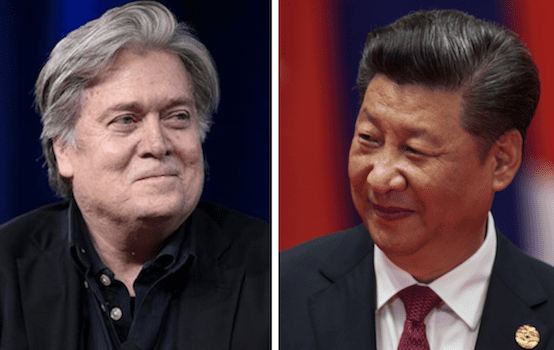Don’t Fall for the China Hawks’ Threat Hyperinflation

The New York Times reports on the Committee on the Present Danger: China, the group organized by Steve Bannon and Frank Gaffney to engage in threat hyperinflation about China:
In a ballroom across from the Capitol building, an unlikely group of military hawks, populist crusaders, Chinese Muslim freedom fighters and followers of the Falun Gong has been meeting to warn anyone who will listen that China poses an existential threat to the United States that will not end until the Communist Party is overthrown.
If the warnings sound straight out of the Cold War, they are. The Committee on the Present Danger, a long-defunct group that campaigned against the dangers of the Soviet Union in the 1970s and 1980s, has recently been revived with the help of Stephen K. Bannon, the president’s former chief strategist, to warn against the dangers of China.
Once dismissed as xenophobes and fringe elements, the group’s members are finding their views increasingly embraced in President Trump’s Washington, where skepticism and mistrust of China have taken hold.
A guaranteed way to know if a group is blowing a foreign threat out of proportion is if it describes the threat as an “existential threat.” China doesn’t threaten our existence as a country. For that matter, China poses little direct threat to U.S. security. China is threatening to displace the United States as the largest economy in the world, and it does challenge the United States’ status as the preeminent power in East Asia, but neither of those represents a threat to our existence. As the authors of the recent open letter have said, China doesn’t have to be our enemy. China is a major power and a competitor with the U.S., and there is always going to be great power competition, but that doesn’t have to be turned into a zero-sum, winner-takes-all rivalry of the sort that the CPD wants. If the U.S. courts conflict with China, both countries and all of East Asia will pay a steep price that doesn’t have to be paid.
It makes no sense to apply a Cold War model to the U.S. and China. The CPD hawks want to turn economic competition into an all-encompassing rivalry, but this would be unnecessary and extremely costly. China may aspire to be the dominant power in East Asia, but given their size, their wealth, and the geography it is difficult to see how the U.S. could realistically prevent that. Short of a catastrophic war that would severely harm the global economy and our security, the U.S. cannot maintain its current position in the region for much longer. Instead of promoting the idea that conflict between the U.S. and China is inevitable, as the CPD does, we should be reassessing what the U.S. role in the region should be and deciding how much of that role is vitally important for the U.S. The U.S. needs to be clear that it will aid its allies if they are attacked, but that it is not looking for a fight with China over uninhabited rocks in the ocean.
The Chinese government is a brutal, authoritarian regime responsible for all kinds of human rights violations. Among other things, it is currently engaging in a cultural genocide against Uighurs and other Muslims in Xinjiang. Our government can and should acknowledge and condemn these abuses and atrocities, and it should be prepared to grant asylum to dissidents and members of persecuted ethnic and religious groups. It doesn’t follow from any of that, however, that the U.S. should pursue a dangerous and costly militarized rivalry with the Chinese government.
If the group’s members were previously dismissed as “xenophobes and fringe elements,” it is telling that all that it takes for them to receive a more respectful hearing in Washington is to make alarmist claims about a foreign enemy. It is an indictment of our foreign policy debates that exaggerating threats and seeking conflict are what it takes to be taken seriously in D.C. If the CPD members were considered “xenophobes and fringe elements” before now, that should make us think twice before following their advice in sabotaging what is one of the most important bilateral relationships that the U.S. has.